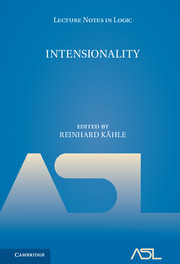Book contents
- Frontmatter
- Preface
- Contents
- The modal aether
- Possible worlds semantics for predicates
- A context principle
- The semantics of modal predicate logic II. Modal individuals revisited
- Intensionality and coercion
- Intensionality in philosophy andmetamathematics
- Representation theorem for models of dynamic intensional logic
- Intension, intention
- Modality, mood, and descriptions
- Coercion vs. indeterminacy in opaque verbs
Preface
Published online by Cambridge University Press: 30 March 2017
- Frontmatter
- Preface
- Contents
- The modal aether
- Possible worlds semantics for predicates
- A context principle
- The semantics of modal predicate logic II. Modal individuals revisited
- Intensionality and coercion
- Intensionality in philosophy andmetamathematics
- Representation theorem for models of dynamic intensional logic
- Intension, intention
- Modality, mood, and descriptions
- Coercion vs. indeterminacy in opaque verbs
Summary
As indicated in the title of this volume, our aim is to launch a discussion about the concept of Intensionality. The authors approach the discussion of intensionality from different perspectives. In addition to the philosophical issues raised by the standard possible worlds approach to intensionality, essays in this volume also address technical aspects of modal logic. The result is a volume that highlights the particular interdisciplinary nature of intensionality with articles spanning the areas of philosophy, linguistics, mathematics and computer science.
Thomas Forster's contribution grows out of three essays which question the role of possible worlds in modern philosophy. In the first essay he argues that in a possible worlds approach some necessary truths — those concerning relations between the worlds — are not justified by truth in all possible worlds. They need the modal aether. The second essay discusses actuality and indexicality and the third one argues that there is no logical proximity relation which is needed for “the closest world”.
In contrast to the extensionalist version of the predicate account to modalities, Volker Halbach, Hannes Leitgeb, and Philip Welch investigate an intensionalist version. In the extensionalist version, modalities are regarded as unary predicates of sentences. It turns out that this approach suffers from serious inconsistency problems. This is not the case for the intensionalist version, where necessity is considered as a predicate of intensional entities. The paper contains a philosophical discussion of a possible worlds semantics for this approach. Following the common possible worlds semantics for operators, the authors work out semantical conditions to single out the appropriate frames which admit a possible worlds model. It turns out that the crucial condition is that “any converse illfounded world must have a large depth”.
In his contribution Wilfrid Hodges shows that any notion of meaning for sentences can be canonically extended to a semantics for the whole language (assuming only some simple book-keeping). The resulting semantics is called the fregean extension and “is determined up to the question which expressions have the samemeaning”. Starting fromTarski's definition of truth, the fregean extension is discussed as a context principle with respect to the linguistic and logical concerns of Frege and Husserl.
- Type
- Chapter
- Information
- Intensionality , pp. v - viiiPublisher: Cambridge University PressPrint publication year: 2005

